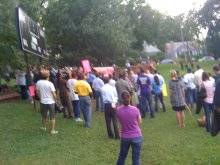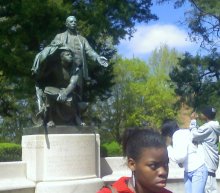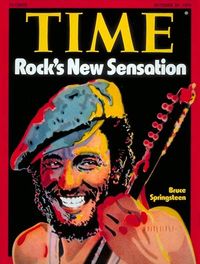
A white guy of about my age, outside with a weed-wacker on a Saturday morning, whacked and now in critical condition at Grady Hospital. He's still in intensive care, but they hope he will be out in a few weeks.
Best I could gather from reading between the lines of reports on our neighborhood bulletin board is that this was a gang initiation or, perhaps, a stupid loss of temper between two guys trying to impress the same girl. The suspects at this writing are still at large and until they're caught we won't know.
Last weekend a protest demonstration was held. We went. There were about 150 people there, including political candidates, cops and neighbors.
By my count over 80% were white. Kirkwood has changed a lot in the last decade but it's not 80% white. Far from it. More like 40%. Maybe less.
More important the whites of Kirkwood are different in important ways from our black neighbors. We're wealthier. We're better educated. We're more likely to be in our 30s, 40s or 50s. We're more likely to be gay, less likely to be regular churchgoers. If we attend any service on Sunday's it's the "church of the brunch" which meets at every breakfast bar in town.
Most Kirkwood teens are black. Almost all of them, in fact, except my son and a few others. Most are being raised by grandparents, or by single parents with no time for them. They go to neighborhood schools through 8th grade, which are improving, but once they hit 14 they're sent across town, most often now to Grady High. I see them at street corners around 7:30 AM, obsessing over their hair or social position, and that's all I see of them.
What happens is they lose their connection with the neighborhood. The area's high school, Crim, closed a few years ago, and Crim was no prize. But at least it was around here.
My black neighbors make a big deal out of 8th grade graduations. I went along with it when my son graduated from Drew Charter School 4 years ago. His high school freshman class had 500 kids. His high school graduation class had 168 kids.
These are elements of the problem beyond neighborhood control. But there is something that can be done.

What if the public junior high school could do the same thing? What if someone were simply keeping track of these alumni after they graduated 8th grade, inviting them in for supervised activities, maybe encouraging them to tutor younger kids. What if someone were asking them about college, helping them plan for it, letting them know they were loved, that there was someone on their side?
What you would have then would be another type of gang. Our gang. A gang of kids with values, with education, united in a common purpose, to make something of themselves.
This won't work for everyone. Real gang life is hard to resist, if you only have one parent, if you're being raised by your grandmother, if expectations for you from the high school are low, and crap-ass teachers can't be fired.
But if Kirkwood had its own gang, and that gang were supported by the community, you would be building a bridge across the color line, you would be helping heal real lives, and you might make events like the recent shooting harder to conceive of.











Let me qualify. I lived in predominantly black neighborhoods from 1979-2006. For me, it was sad to see two generations learn nothing from their own violence, change nothing in their culture to keep kids off the streets, and do nothing to correct fatherless homes. Guys like Bill Cosby and Chris Rock were virtually hated for their messages of “get an education, make a difference to someone, turn down the music, put down the basketball, pull up your pants, pick up a book, speak standard English, and give back.”
Instead, kids played basketball in the streets — on school nights — past midnight, despite the fact that there were several parks within 2-5 blocks of our street. Education is seen as “gay,” and multiple teen pregnancies is seen as the norm. It’s really depressing.
So a job took me to a small town in the Missouri Ozark mountains, which was 97.5% white. What a change; let’s just say white trash exists in layers here. But while we don’t have the violence, we have rampant theft. Last year, black people started arriving in droves, including my neighborhood. I and others offered to help them move in and was turned away. That’s odd. They kept to themselves, never waved or said hi, and didn’t seem to bother anyone.
Within a year, there have been over 300 black people — mostly young adults — move here. We noticed that they didn’t work anywhere, was always walking around the public park during the day and night on cellphones, and when they did drive, they drove BMWs and Hummers. No one else in this town can afford those, even the county doctors and bankers.
But in the last month, the sheriff’s office and FBI arrested more than 107 black residents, all of them accused of dealing meth and herion. And they say more arrests are on the way. My neighbor was among them, and his house is boarded up for a minimum of 20 months by law. I’m sure the landlord loves that.
I’m not racist, but until black people (I don’t call them African-American because with the university here, there are actual Africans who are among the most intelligent students enrolled) can change their own corrosive culture, there’s nothing more I can say or do to help. They don’t have to become white, just stop the tired, predictable cycle of violence and poverty.
Let me qualify. I lived in predominantly black neighborhoods from 1979-2006. For me, it was sad to see two generations learn nothing from their own violence, change nothing in their culture to keep kids off the streets, and do nothing to correct fatherless homes. Guys like Bill Cosby and Chris Rock were virtually hated for their messages of “get an education, make a difference to someone, turn down the music, put down the basketball, pull up your pants, pick up a book, speak standard English, and give back.”
Instead, kids played basketball in the streets — on school nights — past midnight, despite the fact that there were several parks within 2-5 blocks of our street. Education is seen as “gay,” and multiple teen pregnancies is seen as the norm. It’s really depressing.
So a job took me to a small town in the Missouri Ozark mountains, which was 97.5% white. What a change; let’s just say white trash exists in layers here. But while we don’t have the violence, we have rampant theft. Last year, black people started arriving in droves, including my neighborhood. I and others offered to help them move in and was turned away. That’s odd. They kept to themselves, never waved or said hi, and didn’t seem to bother anyone.
Within a year, there have been over 300 black people — mostly young adults — move here. We noticed that they didn’t work anywhere, was always walking around the public park during the day and night on cellphones, and when they did drive, they drove BMWs and Hummers. No one else in this town can afford those, even the county doctors and bankers.
But in the last month, the sheriff’s office and FBI arrested more than 107 black residents, all of them accused of dealing meth and herion. And they say more arrests are on the way. My neighbor was among them, and his house is boarded up for a minimum of 20 months by law. I’m sure the landlord loves that.
I’m not racist, but until black people (I don’t call them African-American because with the university here, there are actual Africans who are among the most intelligent students enrolled) can change their own corrosive culture, there’s nothing more I can say or do to help. They don’t have to become white, just stop the tired, predictable cycle of violence and poverty.
That is not my experience of black people.
Anyone who grows up with only one parent, or perhaps just a grandparent, and no role models in a neighborhood where most people are in the same boat is very likely to wind up turning to crime as the only way out.
It takes enormous government effort to change that. Effort that has not been forthcoming these last 40 years. Result being many black neighborhoods have gone through three generations in the time it has taken us to go through one.
I don’t care what race you are. That’s how things are.
Segregation remains, and with class added to race it’s more pernicious than ever. Witness the growth of the meth trade among the “white trash” you identify.
Dana
That is not my experience of black people.
Anyone who grows up with only one parent, or perhaps just a grandparent, and no role models in a neighborhood where most people are in the same boat is very likely to wind up turning to crime as the only way out.
It takes enormous government effort to change that. Effort that has not been forthcoming these last 40 years. Result being many black neighborhoods have gone through three generations in the time it has taken us to go through one.
I don’t care what race you are. That’s how things are.
Segregation remains, and with class added to race it’s more pernicious than ever. Witness the growth of the meth trade among the “white trash” you identify.
Dana